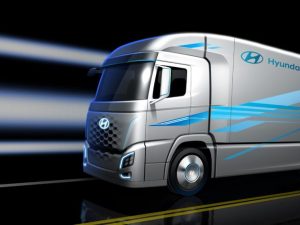

We are living in a very environmentally conscious time, where carbon footprints and fuel emissions are significant to any industry. Year after year, companies are doing what they can to design vehicles that combat pollution with lesser fuel emissions – none more so than the HGV sector.

So it is no surprise that Hyundai’s latest peak at its hydrogen fuelled HGV has been welcomed with open arms at this year’s IAA commercial vehicle show.
The IAA takes place this week in Hanover, Germany and is the largest exhibition and showcase expo within the transport, logistics and mobility sector. Over 2000 exhibitors will be in attendance to address the future of commercial vehicles.
Bold and Brilliant
So far Hyundai has only released a rendered image to whet our whistles and will reveal further details this week in Germany. But judging by the teaser image, we can expect a distinctive, sleek look and of course innovative and efficient aerodynamics. Its front grille is an eye-catching geometric pattern to symbolise hydrogen. The truck is recognisable by its stylised bold, blue accents as already seen on Hyundai’s passenger cars.
What is the difference between electric vehicles and hydrogen ones?
Both are of course better for the environment than petrol or diesel due to their zero emissions function. But you might be wondering what the difference actually is. Hydrogen fuelled vehicles are still classed as a type of electric vehicle, the difference being how their electricity is produced to power the wheels. Unlike the charged batteries used in electric vehicles, hydrogen fuel uses a fuel cell to convert hydrogen into electricity whilst the vehicle is operating.
One huge advantage of a vehicle of this kind, as opposed to an electric fuelled truck, is the refuelling process. Electric vehicles have a lengthy charging time, which on already long drives can potentially slow down deliveries. However, one of the major selling points of Hyundai’s HGV and all hydrogen fuelled vehicles is the fuelling process is cut down to only several minutes. The only downside at the moment is the lack of hydrogen fuelling facilities, compared to the influx of electric charging stations, especially in Great Britain. Yet with more and more manufacturers jumping on the hydro-wagon, this should be set to change in the future.
This innovative, eco-friendly hydrogen truck is set to launch in 2019. Keep your eyes peeled for the full specifications to be revealed at the event.
Just fill in your details below and we’ll send you a free theory test practice with.
Just let us know your score...
We reserve the right to contact you in the
future via this email
By Signing up, you agree to our Terms & Privacy Policy
By Signing up, you agree to our Terms & Privacy Policy
By Signing up, you agree to our Terms & Privacy Policy
By Signing up, you agree to our Terms & Privacy Policy
By Signing up, you agree to our Terms & Privacy Policy